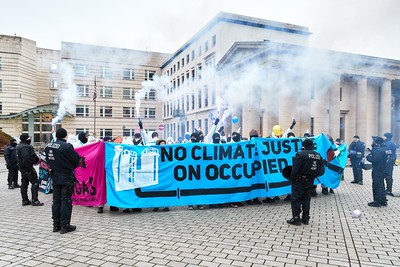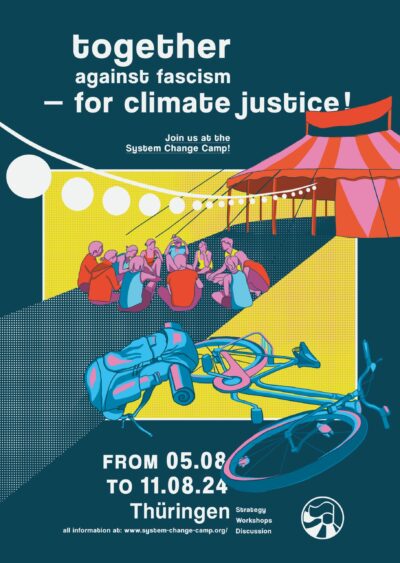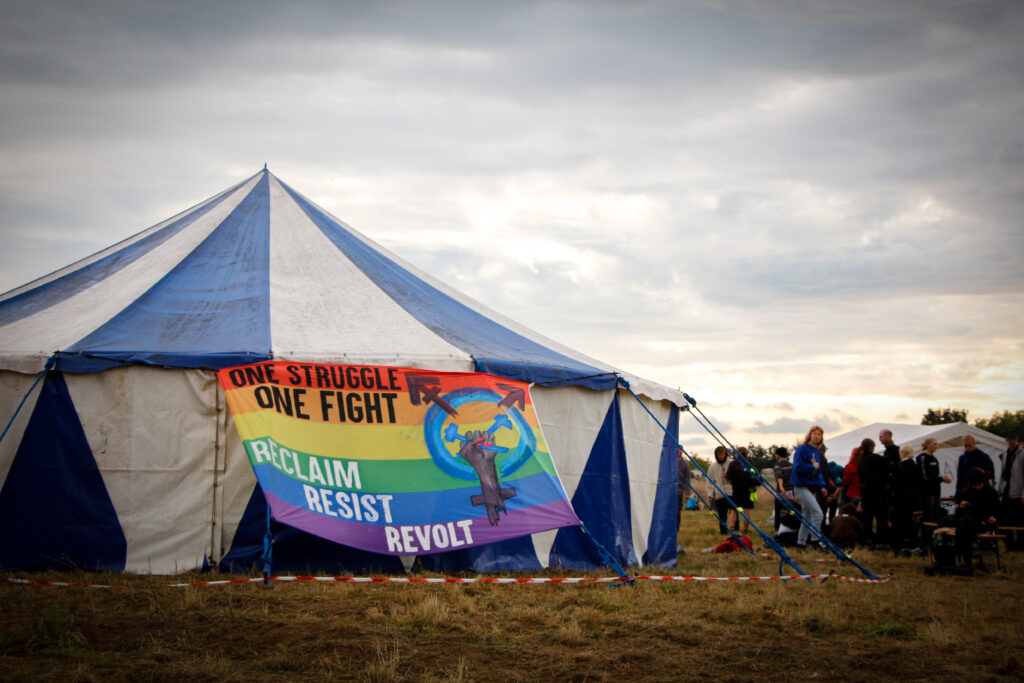NEWSLETTER CLIMATE ANTIREPRESSION #22 – August 2023
Welcome to newsletter number 22,
a schnapps number this time. Fittingly, we are celebrating our birthday this year and are still here for you after 10 years – because repression has unfortunately not stopped. The focus this time is on how the police actually identify people from whom they have not received any personal data, based on our experiences so far.

Content:
RHINELAND
AntiRRR turns 10
Mail after Lützerath
Appeal at Block Neurath
Discuss repression
EAST
DHL: Injustice. Simply Delivered.
Involuntary firefighters: Ava and Ralph stay free for now
Fürstenwalde: Start of trial concerning climbing action at the opening of the Tesla factory
Borna: Ende Gelände 2019 still in court
FOCUS ON IDENTIFICATION
Fast ID and fingerprints
Internal searches (e.g. enquiries at police stations)
Internet research
Public searches
Superrecognizer
Automatic facial recognition
RHINELAND
AntiRRR turns 10
It’s our birthday and we will be 10 years old this year. We want to publish a birthday newsletter at the end of the year. And that’s where you come in: Write us short stories of practical solidarity in the face of repression as you have experienced it in the last years with or without reference to us! Send them to antirrr@riseup.net and we will publish them in our birthday newsletter.
Mail after Lützerath
Many people are now getting mail from the cops because of the mudslinging demo in January, namely summons and hearing forms regarding charges around the eviction of Lützerath. Remember: You don’t have to react to police summonses and hearing forms (and you shouldn’t, because they only investigate us and not for us)! But feel free to contact us and network with other affected people, because upcoming court cases are much easier to go through together than alone.
Appeal at Block Neurath
In April, a person was sentenced to 9 months in prison without probation for “disturbing public operations”, for throttling a coal-fired power plant through a lock-on action. This case is due for appeal in October and we are keeping our fingers crossed that this scandalous sentence will be overturned. Two others still have court dates coming up with the same judge (Dr. Zieschang) at the Grevenbroich District Court – the next one on 25.9. at 11.15 am. Another person will be charged at the district court in Bergheim. By the way, in keeping with our focus today: A large number of those involved have not yet been identified. More information and always up-to-date court dates (occasionally postponed at short notice): https://antirrr.nirgendwo.info/block-neurath
Discuss repression
At the strategy conference of the climate justice movement in January, there was also a small input from AntiRRR. We summarised what kind of repression has been experienced in the last few years, from our point of view. You can find the contribution here.
It should also inspire discussion in your affinity groups or political groups.
- What repression have I / we as a group experienced recently, how do we deal with it?
- What scares me most about repression? What could help to deal with this fear?
- What would it mean for the expected repression (e.g. police contact, police violence, likelihood of charges, expected sentence) if we change our form of action?
- Which anti-repression structures, groups and people do I know? How can we as a group get information or who can answer our questions when there is a problem?
- Will anti-repression work and the costs involved be considered in our next action planning? Who will take care of this? (legal trainings before, organise EA, collect money, accompany processes afterwards, set up contact addresses for those affected, …)
- Where and when can more training/skillsharing take place? For whom and by whom?
EAST
DHL: Injustice. Simply Delivered.
In the summer of 2021 there was a protest action against DHL’s fatal plan to expand the Leipzig/Halle freight airport by 50%. The response of DHL and the authorities to the action are fierce: 54 people were taken into custody for days and are now being prosecuted with claims for damages of up to 500,000 €. Help those affected, order stickers. Of course, we are not calling for stickers to be put on DHL packing stations all over your area.
https://www.ambodenbleiben.de/DHL/
Involuntary fire brigade: Ava and Ralph remain free for now
Court hearings can also be conducted anonymously: Ava and Ralph came anonymously to the appeal hearing at the district court in Cottbus when a power plant blockade by the “involuntary fire brigade” was being tried. They had paralysed half of the Jänschwalde coal-fired power plant in September 2023. The first-instance sentence of 4 months without probation for the two unknown defendants was confirmed. Contrary to the prosecution’s request, however, they did not have to go back to prison immediately, because the regional court did not see any risk of flight (as it did when they were released after just under 3 months), despite anonymity. An appeal has been lodged, so we do not know yet whether they will have to go back to prison. The cases against another 18 identified persons are still pending.
You can also support this time by attending a party on Saturday 2 September in the Autonomous Centre Cologne (AZ Köln), doors open at 7pm.
Suggested donation: 5-10 euros, charity: involuntary fire brigade.
https://unfreiwilligefeuerwehr.blackblogs.org
Fürstenwalde: Start of trial concerning climbing action at the opening of the Tesla factory
At Fürstenwalde District Court, a trial will start on 7.9. at 1 p.m. about an abseiling action over a motorway bridge on the occasion of the opening of the Tesla Gigafactory on 21.3.2021. Three people are accused of dangerous interference with traffic, coercion and common damage to property. Any kind of solidarity trial support is welcome.
Borna: Ende Gelände 2019 still in court
We are about to continue with a trial for trespassing at the Borna district court on the occasion of the Ende Gelände actions 2019 in the Leipziger Land. Sometimes, unfortunately, repressive authorities have a lot of persistence. At the first trial attempt some time ago, three lay defence lawyers were rejected. Another accused person was acquitted because it was not her but her twin sister who was active (the statute of limitations has expired for her in the meantime). Now this person will probably have to defend herself alone. So come along and support in the audience: On Tue, 12.9. at 9 at Borna District Court.
FOCUS ON IDENTIFICATION
Many people in the climate justice movements do not give their personal details during actions and arrests. In the aftermath, there often remains the fear of being identified and the resulting repression. In order for this fear not to remain vague, but to become more assessable, we will look at how the police identify people today. We will try to give you an evaluation on all points based on our experiences in recent years. Of course, we have not been able to observe everything and things may change. As far as we know, the motivation of the cops to get our personal data can be very different and they often do not use all of the following means. This is not least due to the respective time and financial capacities of the police and the interest of the politicians.
Fast ID and fingerprints
The police have a database, more or less an “automated fingerprint identification system”, in which they can store and compare the fingerprints they obtain during identification procedures. In the Rhineland in particular, they often do a so-called Fast-ID, which means that they only take fingerprints (often on the spot) from the thumb and index finger and search for them in the system. Fingerprints are taken either with a scanner or the old-fashioned way with ink (the scanners sometimes don’t work so well if people press on them or smudge them, i.e. are not so willing to cooperate, then the cops more often resort to ink). When usable prints are obtained, matching against the database is the rule rather than the exception.
Fingerprints are also stored on the identity card (or passport). However, the police do not yet have all of these as a database; the fingerprint is only stored electronically on the respective chip card. Anyway there are devices with which the cops can read out the data of the person’s identity card even at a distance of a few metres – however, we are not aware that these devices are increasingly being used.
To disguise fingerprints, many people prepare their hands before the action. To do this, they use razor blades or needles to lightly scratch the top layer of skin or pierce scraps, and then super glue, glitter or dirt is applied on top. Others use Sikaflex as a second layer. Depending on how well it’s done and how stubbornly the cops try to get it off, it can even survive a 7-day detention in NRW (though this requires trial and error and practice beforehand).
By the way, not giving your personal details is only an administrative offence. Although in rare cases the cops threaten to prosecute the taping of fingertips as “resistance against law enforcement officers”, we know of no cases where this was successful.
Internal searches (e.g. enquiries at police stations)
Before a public search is carried out, the police often first try to search for people internally (unless they don’t want to investigate at all, which also happens). Police officers then take pictures of people, for example at left-wing demonstrations, and pull out the people they think they recognise. More frequent (and unfortunately statistically more promising) are enquiries to all police stations in the country (often by email) asking if anyone knows the people they are looking for. This is known from many files of persons who initially acted anonymously. In addition, this method has often been used to identify people who are known locally to the police, for example because they register demonstrations in their city, because they have been active for years, because there are only two left-wing activists in the village or simply because people often appear in many resistant places and their personal details become known at some point. Sometimes, however, this method also leads to more or less funny misidentifications, for example, when journalists who were checked on the spot were suddenly identified as allegedly lock-on activits because their personal details appeared several times.
Internet research
Much less often documented, but also known from files, the police themselves go searching for clues on the internet, comparing their photos with Instagram profiles or other social media platforms – if they are motivated to do a little investigating. There are search engines with which people can be found by their picture. The best way to protect yourself here is to avoid having photos of yourself with names on the internet. However, this is not so easy in a digital age.
Public searches
In recent years, the police in the Rhineland in particular have sporadically, but every now and then, tried to find people through a public search. If they have a high interest in identification (i.e. the state is annoyed by us and our actions), they publish photos of suspects on the internet. Sometimes local newspapers also take over the calls for wanted persons and publish the pictures. These are either pictures from demonstrations or from the identification procedures they have carried out on anonymous arrests. The public searches have to be approved by a judge and may only be made in cases of crimes of considerable importance (what exactly considerable importance means, however, is a matter of interpretation). We know of searches for charges such as assault, assault and battery or disturbance of public business. After publication, informers can report to the police. We know that in some cases “block captains” (people who like to snitch on others to authorities) have run the pictures through an image search to present the results to the police. As far as we know, only a few people have been identified.
If you discover such calls, please do not spread them further so as not to draw more attention to them and make identification as unlikely as possible!
Further tips on how to deal with mugshots can be found here, written by the Rheinland-EA.
For law nerds or for reference: Both public and internal searches (alert to determine whereabouts) are regulated in §131 and §131a of the Code of Criminal Procedure.
Superrecognizer
A new word is doing the rounds, making headlines and sending shivers down the spines of many an activist: superrecognizers are people who can remember faces exceptionally well and quickly recognise people even in crowds. This ability is innate or predisposed and cannot be learned. The police use superrecognizers for searches and investigations, but they are usually “normal” police officers who have been officially certified with this ability. For this purpose, tests are used that the German authorities buy in from the UK. Although the University of Greenwich grants the licences, the scientificity and accuracy of these tests and certificates are justifiably questioned. How well the system works and how reliable the results of the superrecognizers are cannot really be said. At the Federal Police (which is responsible for railway stations and airports, for example), 113 superrecognizers are currently active; at the police authorities of the federal states, the number varies between 3 (in Berlin) and 400 (in BaWü) (source: https://taz.de/Hype-um-Super-Recognizer/!5948941/).
What worries political activists, of course, is the thought that we could now be recognised even more quickly and often and thus be persecuted, be it for surveillance, investigation, punishment or other repression. However, we must not forget that most of the super-recognizers in the German police state have already worked in the police before their certification and even before that people were recognised by experienced investigators. They are ordinary officers, not cyborgs or exceptional geniuses, who have somehow been certified as having above-average talent.
We don’t yet know whether the assignment by a superrecognizer will stand up in court in case of doubt or how often this happens in practice. (Please let us know your experiences!)
Computer facial recognition is usually faster and cheaper, but even less legally secure when it comes to reliability or use in court.
Automatic face recognition
In Germany, automatic facial recognition is fortunately not yet widespread. This technology is used for image matching with internal police databases. Unfortunately, the algorithms there are getting better and better. So far, relatively good experiences have been made with painting faces (with as many dots and lines as possible to disguise the biometric features) and grimaces as a countermeasure. At demonstrations, it is worth weighing up whether (forbidden) masking is smart. So far, the experience is that people are more likely to be recognised by being known to individual cops (see above) than by automated facial recognition – at least that’s what it says in the investigation files.
Other countries like Iran, where violations of the headscarf law are detected by automated facial recognition, or China, where recognition by video cameras is also commonplace, show us the possibilities of authoritarian surveillance societies. Here in Germany, too, there are repeated attempts by the state to introduce more automated facial recognition, which fortunately are held in check not least by fierce protests. How long this will last, however, is questionable.
In conclusion: We recommend being careful, but don’t be too intimidated! Try to realistically assess what the police (/Constitutional Protection Service/Secret Services) can do and what they could use in a specific case. Pay particular attention to digital traces and consider whether you want to disclose personal data on the internet. Talk to each other if you are afraid and things are getting too much for you, for example in the case of long detention, public searches or similar shit. Don’t leave people alone who have been identified and are now facing trial. As long as we stand together, they don’t win.
Until then: don’t get caught and have fun with your next actions,
and remember to contribute to our birthday newsletter!
AntiRRR




